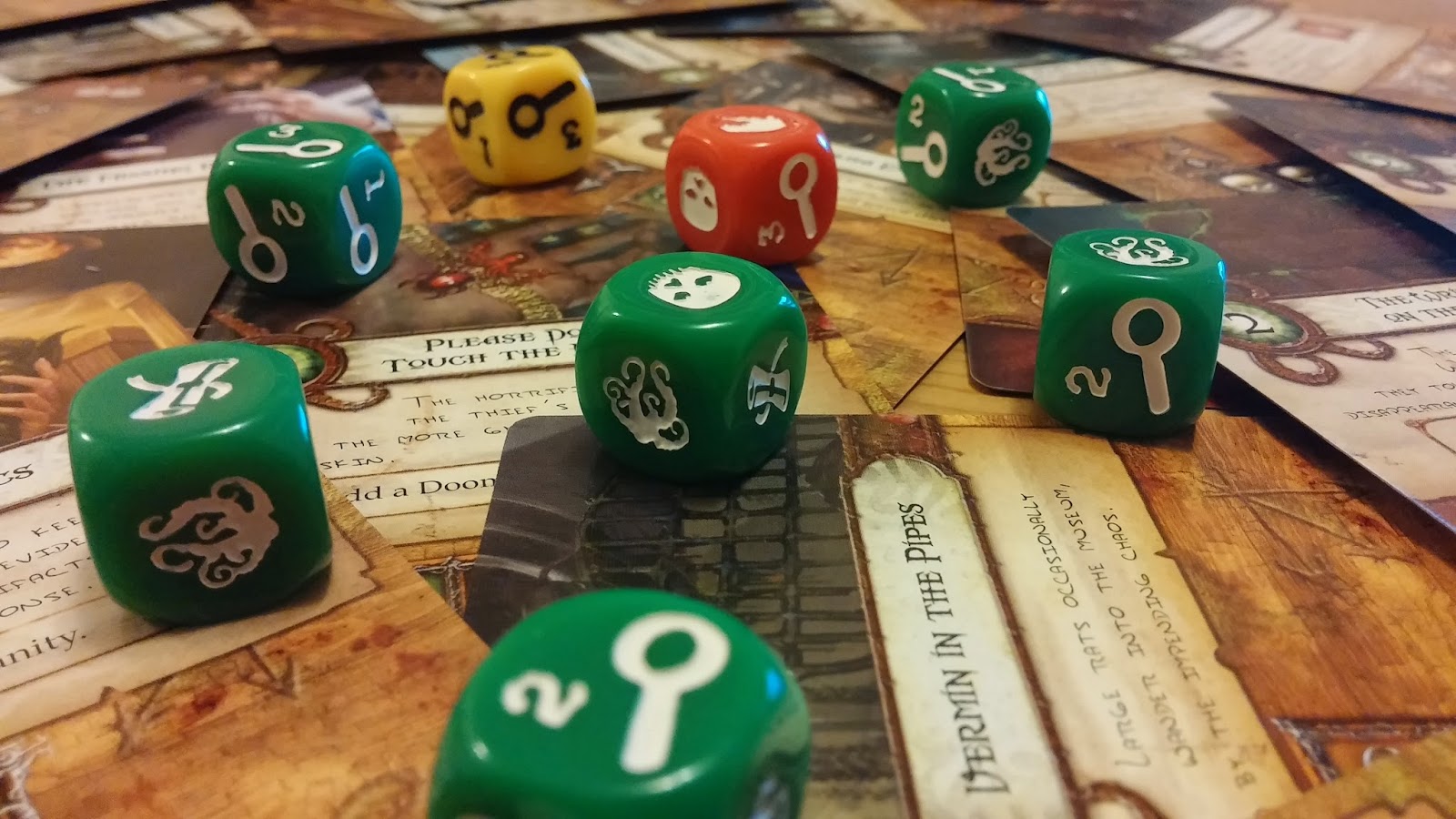Elder Sign (Fantasy Flight Games) is a cooperative game set in H.P. Lovecraft's literary universe. You each play an investigator exploring a museum, on the hunt for Elder Signs to seal off an Ancient One (massive monster) before it awakens and destroys the world.
It sounds very dramatic, but the real drama lies in the dice rolling. You move your character token to a card, representing a room in the building, then roll 6-8 dice to try and match the combination of symbols on the card. If you fail to match a row of symbols with some of your dice you must discard one and roll again. Continue to fail and you will run out of dice - and incur a penalty. Succeed however and you will be one step closer to sealing off that ancient, unspeakable evil.
There is more going on in Elder Sign other than dice play - items to collect, cards with (mostly) adverse effects, smaller monsters that can make their way into the rooms, etc. - but the dice are the important part. The strategy and fun come from figuring out the room best suited for the dice you can roll. How can you and your fellow players most effectively pool their resources and character's special abilities to make this turn a success? Because the penalties are harsh and the bad guys are ready to pounce, so you better do all you can to make the odds swing more in your favour.
Dungeon Roll (Tasty Minstrel Games) is a push-your-luck dice game themed around a dungeon crawl. Each player takes it in turns to roll the party dice consisting of six different companions (and a scroll!) and use these companions to explore the dungeon's levels, fighting monsters and collecting treasure. The player to the left of the current hero gets to roll the dungeon dice; these consist of monsters, potions, dragons and chests.
When party dice are used to fight monsters or quaff potions they are sent to the graveyard out of play. Each time the hero ventures further into the dungeon with his/her companions more dungeon dice are rolled, so choosing to push on in the hopes to get more loot and experience points becomes a tough decision with each roll.
There's not a lot more to Dungeon Roll other than a few hero cards with abilities and some treasure tokens (it has a satisfyingly chunky d10 that's used to mark the current dungeon level), there's certainly not as much depth as there is in Elder Sign. However both games share the same thrill in the luck of the dice.
At the centre of both games is that moment of clutching a bunch of dice in both hands, hoping as you shake them to throw some symbols that will really pay off; willing them to land in the perfect combination and turn the tide. Then there's the release as you let them fly, and the tiny pause as you skim the dice faces, hoping you've got the right combination of Fear, Terror and Lore symbols to defeat that last remaining cultist. Or a healthy mix of Goblins, Skeletons and Oozes to make your opposing hero quake in her boots. And finally, the feeling of elation - or disappointment - as you see your fate staring up at you from the table top in those dice faces... and then the next player picks up the dice and it all happens again.
It's an important gaming experience that these two very different games have at their core. One is a casual competitive game, the other is an intense cooperative game. Both succeed in using the roll of the dice to generate excitement and suspense. And when you're deep in the game - and those dice fly - it's hard to beat that thrill.






No comments:
Post a Comment